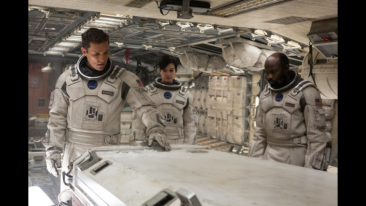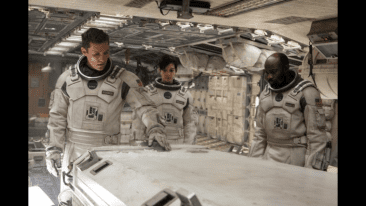In Christopher Nolan’s newest sci-fi extravaganza, Interstellar, Einstein’s general theory of relativity is carefully explained: The closer you approach the speed of light, the slower you age relative to humans on earth. Well, I have a coro llary to this quantum hypothesis: The closer you come to Interstellar, the more likely it will seem that all activity slows … to … a … grinding … halt.
llary to this quantum hypothesis: The closer you come to Interstellar, the more likely it will seem that all activity slows … to … a … grinding … halt.
That’s surprising, considering how jam-packed with noisy activity this three-hour (yes!) adventure film is. There are rocket launches, beautiful trips through wormholes, breathtaking by-the-seat-of-your-pants landings and countless other mind-bending trips through Nolan’s inventive and VFX-fueled brain. Truth be told, though, Nolan has never been much of a storyteller. He’ll spend lots of time acclimating us to characters, then rush headlong through complicated technical points essential to the plot. (Does anyone but him really understand Inception?) Interstellar eases us into its story. We’re never told exactly when it takes place (though apparently later in this century), but eventually we learn that the earth is becoming a desert and mankind will die off unless other habitable worlds are colonized. Matthew McConaughey, a widower with a clingy daughter (played as an adult by Jessica Chastain), is chosen to lead the search alongside Anne Hathaway.Much of the mechanics of the mission are disregarded, though it’s altogether possible they were stated plainly but the editors deemed it far less important than Hans Zimmer’s intrusive score and pulsating sound effects that effectively drown out even the internal dialogue in your head. It’s a sonic assault.
Nolan makes a lot of peculiar choices: There are near countless shots of the outside of the spaceship, but usually seen only from the same angle along the length of the fuselage — it’s like having a window seat on an airplane and trying to figure out what your journey looks like from the outside. He also resorts to some heavy-handed imagery (a potential savior of the species named Mann? Really?).
Ultimately, though, Nolan is less interested in the science than in the humanity. The development of McConaughey’s character — across time and space — is poignant and highly emotional. But last year Alfonso Cuaron got us there in half the time (82 minutes!) with Gravity, while Kubrick explored the position of humankind in the universe a generation ago with 2001: A Space Odyssey. Interstellar isn’t as good as either of those films, but that doesn’t mean it doesn’t have merit. “Good” may be the enemy of “great,” but don’t write it off entirely.
Three stars. Now in wide release.














